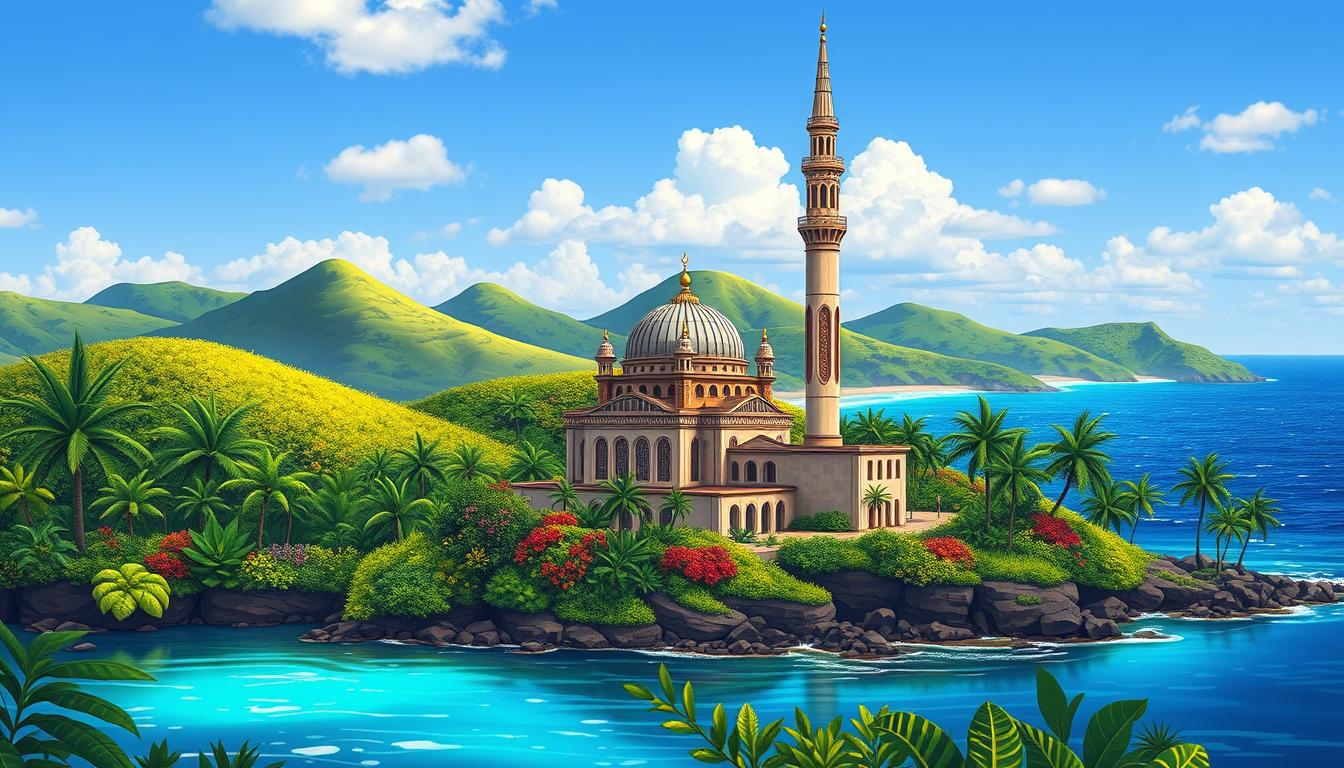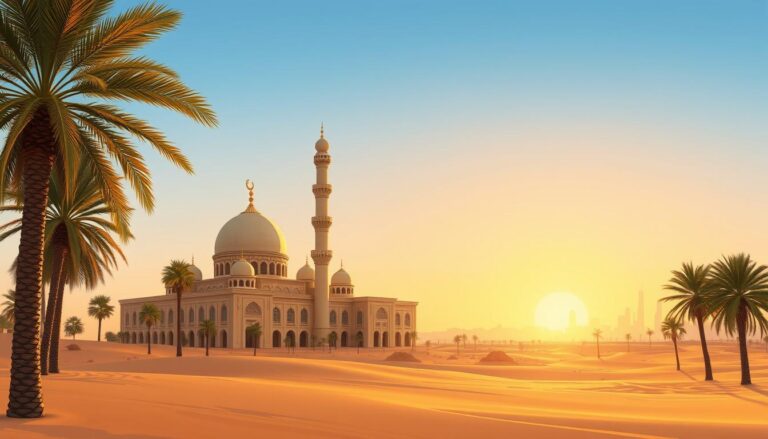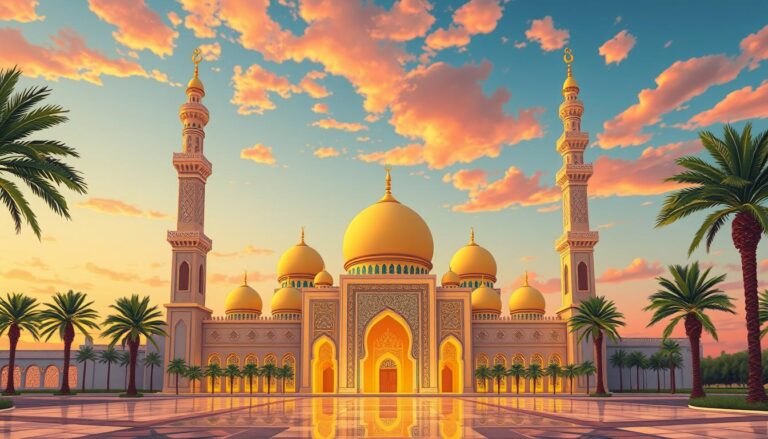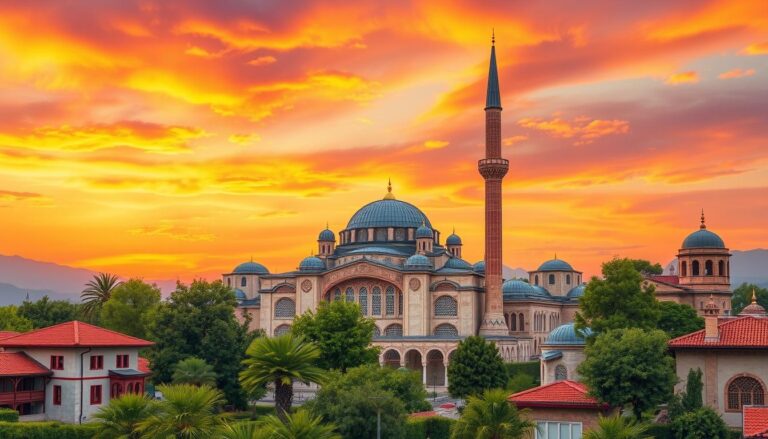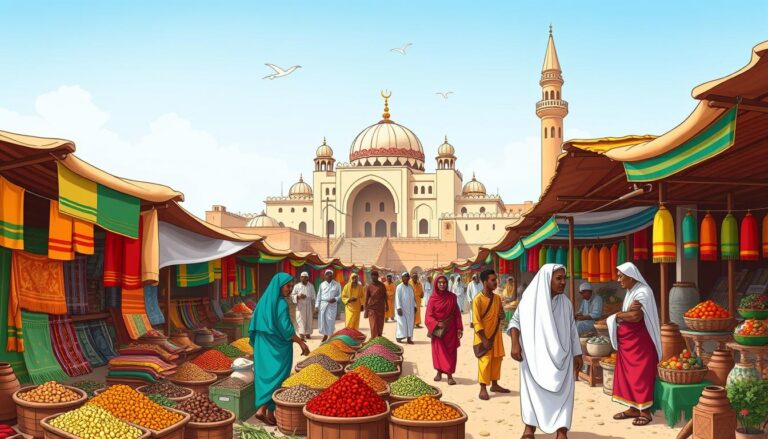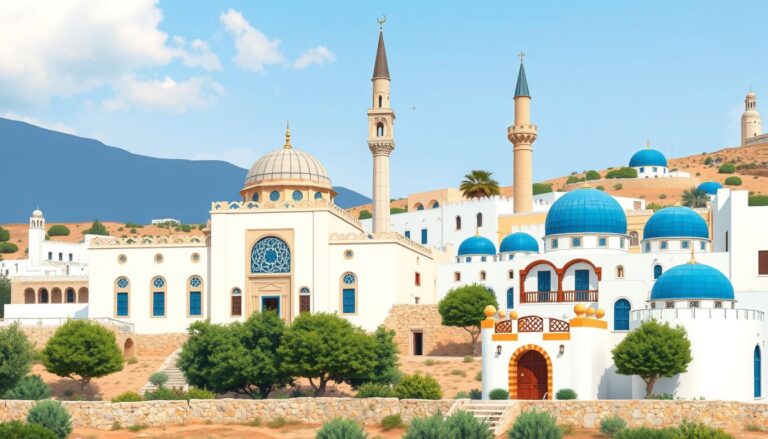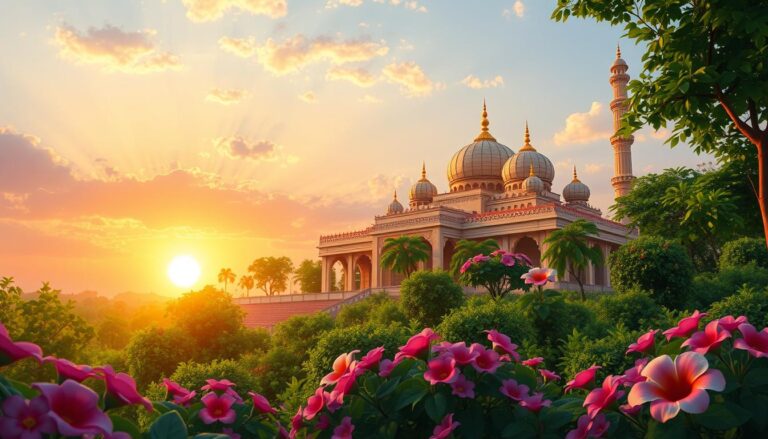Islam in the Comoros
The Comoros, a small archipelago nation in the western Indian Ocean, is a stronghold of Islam. About 98% of its population follows this faith. Most Comorian Muslims are Sunni, following the Shafi’i school of jurisprudence.
They are mainly of Arab-Swahili descent. There’s also a big group of people of Indian, especially Gujarati, origin.
Islam is deeply rooted in Comorian culture and identity. Arab merchants and exiled Persian princes brought Islam to the islands. They were involved in the Indian Ocean trade since the 9th or 10th century.
Over time, the ruling families of the Comoros adopted Islamic practices. They learned Arabic, went on the Hajj pilgrimage, and connected with other Muslim communities. These include Kilwa, Zanzibar, and Hadramawt.
Introduction
The Comoros, an archipelago in the Indian Ocean, has a rich history with Islam. The exact start of Islam in the Comoros is unclear, but a local legend says it came during Prophet Muhammad’s time. This historical background shows how important Islam is in Comorian culture and society.
Historical Background of Islam in the Comoros
The Comoros, between Madagascar and Africa, has seen many cultures and religions. Over time, Arabs, Persians, and Swahili traders arrived, adding to the religious significance of the area. Today, Islam is a key part of who the Comorians are, with their leaders connected to the Muslim world and Islamic traditions in their culture.
Significance of Religion in Comorian Culture
In the Comoros, Islam is deeply woven into daily life. There are many mosques and madrasas, and religious festivals are celebrated. About 98% of the people are Muslim, showing the widespread faith in the Comoros. This strong faith has shaped the politics and society of the islands, with Islamic values in many parts of life.
“Islam has long been a central part of Comorian identity and social life, with ruling families maintaining close ties to the broader Muslim world and Islamic practices permeating various aspects of the islands’ culture.”
Demographics of Islam in the Comoros
The Comoros, an island nation in the Indian Ocean, is mostly Muslim. About 98% of the people follow Sunni Islam. Most of these Muslims follow the Shafi’i school of Islamic law.
Percentage of Muslims in the Population
The Comoros has a population of 900,141. Almost all of them, about 98.1%, are Muslim. This makes the Comoros one of the most religiously uniform countries globally.
Sunni Islam and the Shafi’i School
In the Comoros, Sunni Islam is the main religion. Almost all Muslims there follow the Shafi’i school of law. This school greatly influences their religious practices and beliefs.
“The overwhelming Muslim majority in the Comoros reflects the central role that Islam has played in the country’s history and the strong influence of the religion on Comorian culture and identity.”
Islam in the Comoros
The Comoros archipelago has a rich history of local legends and the early spread of Islam. It’s said that Islam came to the Comoros in the 7th century. Two Comorian nobles, Fey Bedja Mwamba and Mtswa Mwandze, brought it back from Mecca. But, the truth of this story is still debated.
Yet, it’s known that Arab merchants and exiled Zayidi Persian Shirazi princes helped spread Islam. They were part of the Indian Ocean trade network, which the Comoros joined early. Their presence helped Islam grow in the islands.
“Islam has been an integral part of the Comoros’ history and identity, with its influence deeply woven into the fabric of the archipelago’s society and traditions.”
The impact of these Arab merchants and Persian princes is still seen today. The Comoros’ culture, buildings, and Islamic values show their lasting influence.
Mosques and Holy Places
In the Comoros, hundreds of mosques dot the islands. They are not just for worship but also for community and learning. These mosques show how important Islam is to the Comorian culture.
Almost all Comorian kids go to Quranic schools, or madrassahs, for a few years. They start around five. There, they learn about Islam and Arabic, starting a lifelong faith journey.
Significance of Mosques in Comorian Society
Mosques in the Comoros are more than worship spots. They are key for community and learning. People visit tombs of Islamic saints and Sufi founders on special days, showing great respect.
The Grand Mosque of Moroni, built in the 1970s, is a big mosque in the Indian Ocean. It shows the value of mosques in Comorian culture. The Mutsamudu Old Town, from the 15th century, is a treasure of Swahili culture and architecture. It has many historic mosques that are still important today.
“Mosques have long held a central place in Comorian society, serving not only as places of worship but also as hubs for community life and education.”
Islamic Holidays and Festivals
The people of the Comoros Islands are deeply religious. They follow Islamic orthodoxy closely. They celebrate all major Muslim holidays with joy and festivity.
Observance of Religious Festivals
Important Islamic festivals like Id al-Adha, Muharram, Ashura, Laylat al-Mi’raj, and Ramadan are celebrated with great respect. Comorians seek advice from mwalimus (religious leaders) or marabouts (Islamic mystics). They do this to find the best days for events and to protect themselves from jinn (spirits).
Mawlid Celebrations and Feasts
- The Mawlid, which honors Prophet Muhammad’s birth, is a big deal in the Comoros.
- Mawlid is celebrated with lively festivities, ending in a big feast for the ulama (Islamic scholars).
- Many Comorian women wear the chirumani, a special cloth, during these celebrations.
The Mawlid has its roots in the 8th century in Mecca. The first public celebrations of Muhammad’s birth started about four centuries after his death. The oldest Mawlid text is thought to have come from Persian lands in the 12th century.
“The Mawlid celebration, which commemorates the birth of Prophet Muhammad, is particularly notable, marked by festivities culminating in a feast prepared for the ulama (Islamic scholars).”
Political Islam and Governance
The Comoros has faced political instability and economic issues since gaining independence in 1975. This situation has led to the rise of different groups. They use religious support to fight for power and solve social problems. These groups believe in using Sharia law to fight corruption.
Role of Islam in Comorian Politics
Islamism and Wahhabism are growing in the Comoros. This is partly due to students returning from Islamic studies abroad. They are unhappy with the government’s injustice and chaos. Some want to replace the current system with an Islamic republic based on their religious views.
Islamism and Wahhabism Influences
- The Comoros has a mostly Sunni Muslim population, with over 98% following the Shafi’i school of Islamic jurisprudence.
- The rise of Islamist and Wahhabi ideas has put pressure on the government. They want more conservative policies and Sharia law.
- Minority religious groups face fines or jail for not following Sunni practices. This makes them feel left out.
- The government picks the Grand Mufti, the top religious leader. This helps them control religious and political matters.
“The growing influence of Islamism and Wahhabism in the Comoros has led to growing tensions between competing political and religious factions, as they seek to shape the country’s future through the lens of their interpretations of Islamic principles.”
The Comoros is facing tough times politically and economically. The mix of religion, governance, and different views will shape its future.
Islamic Education and Practices
In the Comoros, Islamic education is key to the nation’s culture and faith. Quranic schools, or madrassahs, are found everywhere. They are centers for learning and community life.
Almost all Comorian kids start learning at these Quranic schools at five. They spend two to three years learning about Islam and Arabic. These schools are more than just places to learn. They are also where people come together.
- Some rural Comorian kids even live with their teachers, called madrassa instructors, to help with their work.
- Learning Islamic scriptures is also a must in public schools. This shows how important Islamic education is in Comorian schools.
Quranic schools and madrassahs are vital for keeping Islamic faith and traditions alive. They make sure the next generation stays connected to their religious roots.
“Virtually all Comorian children attend Quranic schools for two to three years, usually starting around the age of five, where they learn the fundamentals of Islam and Arabic.”
Minority Religious Groups
In the Comoros, Islam is the main religion, with over 98% of the people following it. There’s a small Christian group, mostly Roman Catholic. In 2023, about 0.5% of Comorians were Christian, down from 2% in 2009.
Law bans spreading any religion except Sunni Islam. Shia and Ahmadi Muslims face big challenges in practicing openly. These groups often keep their faith private to avoid trouble.
Christianity and Other Faiths
The Comoros Constitution makes Islam the official religion. This makes it hard for other faiths to grow. Roman Catholic Christians are the largest minority, but they’re less than 1% of the population.
Protestant Christians are even fewer. Other faiths like Hinduism and Shia Islam also make up less than 1% of the people. The government strictly limits spreading any religion except Sunni Islam. This makes practicing Christianity openly almost impossible.
“The Government banned non-Sunnis from proselytizing, with a law stipulating a prison sentence and fine for those who teach Muslims a religion other than Islam.”
Challenges and Controversies
The Comorian constitution makes Islam the state religion. Sunni Islam, following the Shafi’i doctrine, guides worship and social life. This has caused big problems for religious minorities.
It’s illegal to spread any religion except Sunni Islam. The law also says foreigners who do this can be deported.
In 2019, security forces arrested 30 to 40 Shia Muslims. They were accused of not following Sunni Islam. But, they were later freed because they were foreigners.
The government has also allowed harassment of those who don’t follow Sunni Islam. The president said Shia Muslims can’t be true Comorians.
Freedom of Religion and Proselytization Issues
The freedom of religion and proselytization issues have caused big challenges and controversies in the Comoros. The government’s strict rule of Sunni Islam has pushed other religions to the side. This makes it hard for them to practice and share their faiths.
- Proselytizing for any religion other than Sunni Islam is illegal, and foreigners caught engaging in such activities face deportation.
- In 2019, security forces arrested between 30 and 40 Shia Muslims, though they were later released as they were all foreigners.
- The government has explicitly condoned harassment against individuals practicing non-Sunni forms of Islam, with the president stating that Shia Muslims cannot be considered true Comorians.
“The government’s strict adherence to Sunni Islam has led to the marginalization of other religious groups, limiting their ability to practice and propagate their faiths freely.”
These issues show the ongoing challenges and controversies about freedom of religion and proselytization in the Comoros. The government’s rules keep restricting the rights of religious minorities.
Islam in the Comoros
Unique Aspects and Influences
Islam in the Comoros has special features that show the islands’ rich history and diverse cultures. The strong presence of Sufi orders like Shadhili, Qadiriya, and Rifa’i is one of these. They mix orthodox Sunni Islam with local spiritual traditions.
The veneration of tombs of Islamic holy men and Sufi founders is another key aspect. These sites are important for pilgrimage and show the role of saint worship. They also highlight how local beliefs are woven into the religious fabric.
The Comorian diaspora keeps strong ties with the Muslim world, especially through the Hajj pilgrimage. This connection with the global Islamic community helps define the Comoros’ identity within the wider Islamic world.
Islam deeply influences Comorian culture, education, and governance. It shapes the social fabric and identity of the Comoros. Quranic instruction in schools and the use of Sharia law in the legal system are examples. The unique aspects and influences of Comorian Islam are deeply ingrained in the archipelago’s life.
“Islam is not just a religion in the Comoros, but a way of life that permeates every aspect of society.”
Conclusion
Islam is the main religion in the Comoros, with over 98% of people being Sunni Muslim. They follow the Shafi’i school of jurisprudence. The religion has a long history in the islands, with stories of its arrival during Prophet Muhammad’s time.
Arab merchants and Persian princes also played a big role in spreading Islam early on. Mosques, Quranic schools, and festivals are key in Comorian society. They show how important Islam is to the islands’ culture and identity.
However, the government’s choice of Sunni Islam as the state religion has caused problems. Religious minorities face limits on practicing their faiths openly. The mix of Sufism and ties to the wider Muslim world adds to the complexity of Islam in the Comoros.
Despite these challenges, Islam is deeply tied to the Comoros’ national identity. It acts as a unifying force in the country. Understanding Islam’s role will help address the challenges and opportunities it brings.
Source Links
- Islam in the Comoros
- Religion in the Comoros
- A Nation Born from the Hybridization of Arab and Bantu Cultures: The Spread of Islam in Comoros
- Islam in Comoros
- Comoros | Population, Religion, Flag, Language, Culture, History, & People
- No title found
- National Profiles | World Religion
- Comoros
- Comoros
- Comoros – Ethnic Groups, Religion, Language
- Religious minorities fear backlash as Sunni Islam declared state religion of Comoros – World Watch Monitor
- Cultural or Historical Sites of Comoros: Important Cultural Landmarks or Historical Sites In Comoros – Earth Site Education
- Culture of Comoros – history, people, traditions, women, beliefs, food, customs, family, social
- Mouloud in Comoros in 2025 | Office Holidays
- Comoros – United States Department of State
- Comoros – United States Department of State
- 2016 Report on International Religious Freedom – Comoros | Refworld
- Freedom of religion in the Comoros
- Religion In Comoros Today
- Jihadism in Francophone Western Indian Ocean Islands: Cases from Comoros, Réunion, and Mauritius
- Constitutional Reform: Decolonization in the Comoros Islads
- Comoros – United States Department of State
- 2015 Report on International Religious Freedom – Comoros | Refworld
- Comoros | Open Doors Canada
- Comoros – United States Department of State
- Microsoft Word – IRPP_COM_UPR_S5_2009_InstituteonReligionandPublicPolicy.docx

